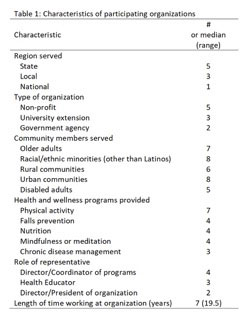Session Information
Session Type: Poster Session D
Session Time: 1:00PM-3:00PM
Background/Purpose: Physical activity (PA) is effective in the self-management of arthritis. As such, several evidence-based programs aimed at supporting safe and meaningful PA have been developed, including Walk With Ease (WWE), a 6-week walking and behavior change intervention. The self-directed version of WWE has been translated into Spanish, Camine con Gusto (CCG). Unfortunately, few organizations have adopted and disseminated CCG to their Spanish-speaking community members. Guided by the Diffusion of Innovations Theory (DIF), the purpose of this study was to explore how organizations learn about, decide to adopt, disseminate, and sustain evidence-based programs like WWE/CCG.
Methods: This study used qualitative data from one-on-one interviews with representatives from organizations that serve or are interested in serving more Spanish-speaking Latinos. Organizations may or may not have already disseminated WWE and/or CCG and could serve communities at the local, state, or national level. A semi-structured interview guide was created to explore the 5 stages of the DIF: knowledge, persuasion, decision, implementation, and confirmation. Rapid qualitative analysis was used to examine themes and subthemes based on the DIF.
Results: Nine organizations were included in the study that served state (n=5), local (n=3), and national (n=1) communities. Five were non-profits, three were university extensions, and two were government agencies. We interviewed two Directors/Presidents, four Program Coordinators, and three Health Educators. The following themes emerged based on the DIF stages: 1) Knowledge: Organizations become aware of programs through their partnerships, funders, or government-created lists of evidence-based programs. 2) Persuasion/Decision: Organizations need to know if a program meets their community’s needs, funding is available, additional resources are needed to start and run the program, and the program is evidence-based. 4) Implementation: Organizations typically pilot test a program to ensure its success before adopting it permanently. Several organizations have culturally adapted and/or modified programs to increase community uptake (e.g., adding one-on-one coaching or pedometers to WWE/CCG). 5) Confirmation: Primary reasons for maintaining a program were attendance and cost.
Conclusion: Findings show that CCG is well-suited for adoption by organizations because it is low-cost, brief, and evidence-based. To further expand its demand, Spanish-language program materials should be made ready “right off the shelf,” success stories from other organizations should be marketed, and further research is needed to examine the cost-benefit analysis of adding health coaches and pedometers to the program.
To cite this abstract in AMA style:
Meza Jarquín M, Callahan L, Weisner S, Ambrose K, Soto S. Exploring How and Why Organizations Identify, Adopt, Disseminate, and Sustain Evidence-based Programs for Latinos with Arthritis [abstract]. Arthritis Rheumatol. 2022; 74 (suppl 9). https://acrabstracts.org/abstract/exploring-how-and-why-organizations-identify-adopt-disseminate-and-sustain-evidence-based-programs-for-latinos-with-arthritis/. Accessed .« Back to ACR Convergence 2022
ACR Meeting Abstracts - https://acrabstracts.org/abstract/exploring-how-and-why-organizations-identify-adopt-disseminate-and-sustain-evidence-based-programs-for-latinos-with-arthritis/

